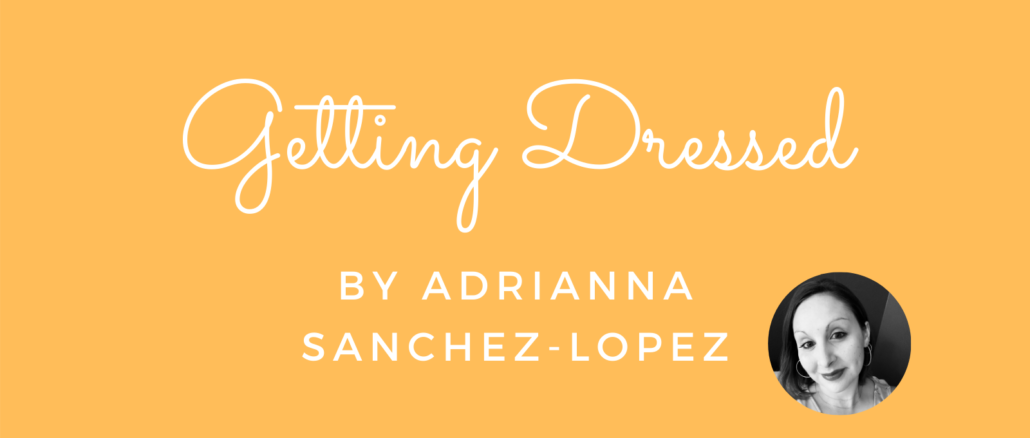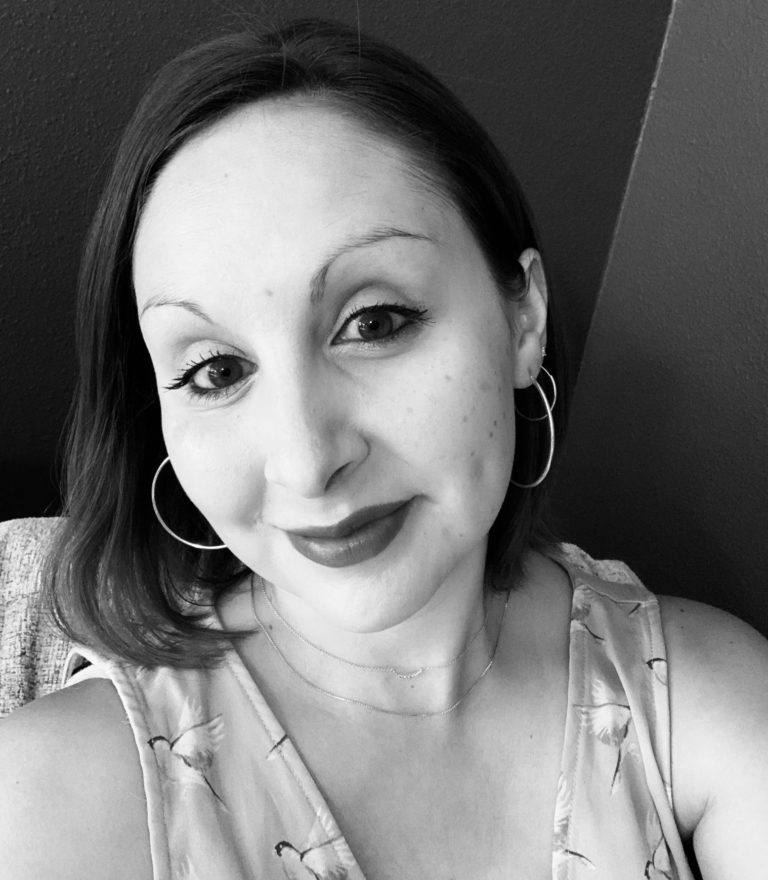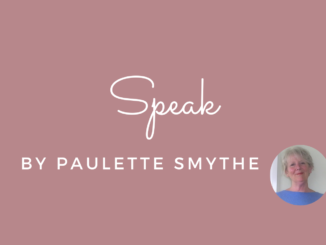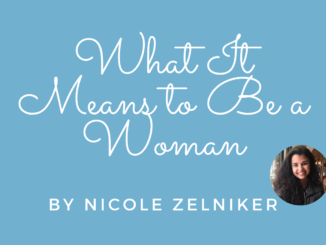
Because I’m one of those prehistoric few who still shop from catalogues, I found the jeans in one of the many that I still receive. I like to flip through the flimsy recycled paper after a long day, dog-earing pages with items that I imagine residing in my own closet. I rarely order the various articles of clothing that I admire, but the jeans, well, they were different: sun-bleached denim embroidered with bright red roses and green vines down the legs; tapered fit with just the right Lycra to cotton ratio to make them hug my curves. I loved them. I’m a sucker for roses. I’m a sucker for fashion statements. It wasn’t long before my computer was on my lap, fingers furiously typing in the item number and clicking “Checkout.”
The first time I slid them on, my childhood materialized before me. I’m standing in my great uncle’s house, watching a pulsing mass of cousins and family friends—all women—dress for a party in the master bedroom. Whenever I’m asked to define my sense of style (and trust me, I’m asked more often than I would like), I think of this moment. It’s loud in the room—women talking over one another, cumbia hips and steps between coats of mascara in nothing but heels, shapewear, and a slip here or there. One woman tries on a top, glances in the mirror and decides it’s not for her. “You try it,” she says to whoever’s nearest. Too pretty of a top to sit the party out, another woman wiggles it over her head. The room is a hive of sweat, laughter, and musk. The scent, like an accessory, drapes laughter; embellishes stray shrieks of anticipation. Makeup is shared, women complimenting one moment and teasing the next. Colorful fabrics—silk, satin, lace, polyester, and even leather—beckon the eye’s attention to the bed, dressers, chairs, and, finally, the open arms of the closet, poised in anticipation for a warm embrace.
“Come here, jita.”
I smile shyly, padding my way to Denise while barely lifting my feet, an obvious attempt to appear reluctant when in all truth my heart is screaming with joy so loudly I fear they can hear the exaltations through my pores. Denise is about the same age as my mother. I love her voice—it’s scratchy with just a bit of a growl. She’s my Marilyn Monroe—Selena and Audrey Hepburn all bound up into one. “This color,” she shows me a deep berry lipstick, “is perfect for you!”
I purse my lips, ready for my mark of womanhood. She laughs deeply, the sound grating against my anticipation. I’m so going to be her someday.
“Relax! I can’t put it on with your lips all puckered like that!”
New lipstick on, I become the pulsing vein of the room. I’m feminine energy; omnipotent and ever-present. I’m beautiful. I sit on a chair by the bed, imagining myself as the keeper of the chaos. As you were, mere mortals, as you were. I absorb the layers of jewelry and bright clothing. I squeeze my eyes closed, memorizing spray after spray of perfume. Cold cream. Powder. Eye shadow. Rouge. Penciled-in brows. Layered necklaces and bracelets; oversized gold hoops. Words spoken to no one and everyone: “How do my boobs look? Good, right?”
This. This is what it means to be a woman. So different than how I dressed at home—quietly and oftentimes with sleep still lingering in my eyes—I felt myself patched into the quilt of a culture I yearned to call my own on a full-time basis. How I wished that I lived nearby. How I wished they would remember my presence, even after I returned home. I yearned for an encore. I yearned for a group of women of my very own to get dressed with every day.
Each and every time I button the jeans and look in the mirror, I feel beautiful, just as I did in that moment. Beautiful isn’t a word I use to describe myself often, but the jeans are damn near magic—they’re a tonic, a talisman for all my usual self-loathing. (And paired with a glass of wine at the close of a day? They’re divine!) The first time I wore them to class, one of my students proclaimed, “Professor! I love your jeans—they’re fierce!” A coworker once commented on my “joyful pants” on a dreary morning. By far, my favorite jeans.
I made the calculated decision to strut them in a new city, dressing in my brother’s bathroom by artificial light. Well before the sun’s grand entrance, I pair the jeans with my favorite booties and a chunky black sweater. A rare visit and overnight stay at his house, I’m eager to share the morning with my nieces.
From the top of the staircase, I can see my brother and husband in the dining room below. They sip coffee, carrying on a conversation I can’t hear while leaving large, crescent-moon-shaped bites in their bagels.
“Morning!” The greeting, uncharacteristically cheerful for me, saturates the kitchen and dining room with the magic of the jeans. I select a bagel, and reaching for a knife, I gush about how my niece woke me with a story about Elsa and opening Christmas presents at my house. My voice is always a pitch or two higher when I’m around him. My act just a bit more amplified and cheerful.
His silence, uncharacteristic of him, slices through my act. Our eyes meet: “Are those flowers?” Gawking at my jeans with a smirk of disgust (it’s a look, I promise), his voice turns thin, accusatory: “What are you wearing? You look…you look like a Mexican.”
Knife poised above the unsliced bagel, I stand speechless before my brother. I don’t know what to say. Fury pricks its way up from my neck and all over the back of my scalp. Words abandon me—literally, they dutifully march away the way words always do when inferiority strikes. Keeping me in my place.
I hear someone shuffle behind me, trying to move unheard. Turning with this weight in my gut that unfurls when I know it’s something I can’t readily explain, I see my 14-year-old daughter standing at the base of the stairs. She heard him. I want to be a role-model, to show her how to respond. But he’s my older brother—blood of my blood—sitting before me slinging the word Mexican as if it’s not in the vocabulary of our blood; as if it’s not in my husband’s blood, my daughters’ blood. As if it’s a dirty word. And the filth of his intentions disfigures the very air which we must breathe to survive: a thick cloak of noxious intent. I’m suffocating here. Why the fuck can’t I speak?
He must have noticed me turning the bluish violet shade of an arm when the nurse keeps it wrapped tightly for too long in the name of drawing blood, for just then he stands upright. Hands tucked into the pockets of his designer jeans. Casually, leaning into the bar: “I’m just joking.” Dense, hollow words thickening the air.
I return my attention to my bagel, trying to force it into two sections. It’s stubborn, refusing to submit to the pressure of my knife.
These jeans. I love them; I love the way they make me feel. And yet. The words, I realize, are not my own; they were spoken in a documentary I once showed my students. Elie Wiesel, explaining what he believes to be the most powerful phrase in the English language: and yet. I want there to be some great symbolic reason for the emergence of these words—something poetic or profound. But I don’t know why these words come to me. The human mind wills its own vocabulary; has its own patterns and associations that we do not always understand. All I know—at that moment and in that room—are the shapes formed by the words, by their sounds. I accept them, for I’m ravenous: hungering for my own voice. I want to tell him that I love these jeans—that they’re stylish. I want to tell him that there’s nothing wrong with looking like a Mexican. Our mother looked like a Mexican (a mestiza, some would say). She was beautiful. I want to tell him, as these new thoughts agitate their way through me, yet nothing emerges. My voice betrays me.
My niece tugs on my arm with the impatience of a toddler: “Are you done yet, Auntie? Can we show you New Frozen?”
Something in the innocence of her smile awakens me from my paralysis: “‘New Frozen,’ huh? Does Elsa make another snowman?”
She giggles and shrugs with dramatic flair. “You have to watch it, silly!” I hear her throaty laugh and the crater in my stomach grows fangs.
“I would love to, honey, but we have to go soon. How about I rent it when I’m home and I’ll call you? We can watch it together over the phone.”
“Yeah! Can we do that, daddy?”
“We’ll see, honeybee.”
He’s a good father. He’s gentle and attentive. He’s always braiding hair and packing lunches: becoming everything to them. I worry that sometimes he encourages “girly” toys in contrast “boy” toys too much, but he wears his love for them proudly. Yet, as I watch them play, I can’t help but feel as if they will never have that bond that I so desperately yearned for—they will never crowd into a bedroom together with their cousins and aunts, preparing for a party. It feels like a void between us. I don’t know if I can stretch myself into a bridge.
When my brother announced his engagement, he asked my family—my husband, my daughters, and me—to be part of his wedding. We attended our fittings, my husband receiving nods of approval while the seamstress clicked her tongue at how the dress fit my hips but not my breasts. I chose a semi-fitted one-shoulder dress in the eggplant satin that my soon-to-be-sister-in-law requested. (Modern brides let their bridesmaids choose their cut, of course.) It had a small flower embroidered into the single shoulder strap. It was gorgeous. When I asked for approval, the bride mused as to whether I might remove the flower, to keep it more uniform. So I did. What else are great sisters-in-law for?
The morning of the wedding we awoke in the spacious cabin (read: guest house with rustic furnishing and a wooden frame) that my mother rented for the location wedding. Excitement infused every single skin cell on my body: this is another rare moment of female convergence. Or so I told myself.
Before the day started, I opted to duck out for a quick run. There’s nothing like running in mountain air. I knew that I would be sitting most of the day, and I wanted to release my pent-up energy. I wanted my skin to glow. A half mile in my fingers tingled, and my cheeks burned. My heart thudded from not only my pace, but also from my anticipation. I couldn’t wait for the bustle and familiarity that I had experienced so many years ago, and I found myself turning around. I had to get back to that cabin. I would finally get to partake in the ritual of getting dressed as a grown woman!
When I returned, everyone was getting ready. The men had already left to get dressed at some unidentified location. I rolled my eyes. As my eyes regained their equilibrium, I was shocked at how reserved everything was. The bridesmaids whispered to one another. At first, I thought it was a passing moment. But as I came down from the high of my run, sweat droplets pooling in the most unflattering ways, I realized my own alienation. In the privacy of the shower’s steam, I swallowed the truth for the first time: I’m not part of the bride’s “real” wedding party. Yep, I was that awkward, obligatory bridesmaid. The other girls dressed quietly. My mom, living with terminal cancer at the time, asked for help. As I placed her carefully selected dress over her head (she had purchased and brought three different dresses for the occasion) and buffed her cheeks with color, she adopted the hushed behavior of the cabin. She spoke rapidly of her excitement, but in a muted pitch. I tried to ignore the twinge in my heart, the lightning strikes crashing into the hollow of my gut.
I watched the bride’s aunt—a supposed makeup artist—apply the bride’s makeup. I had declined the opportunity earlier; I’m weird about being touched by people. It’s a deep-seated muscle of my identity, and one that often causes others to label me bitch. That day, however, something in me wanted to be a part of the moment beyond anything else; I wanted to feel that female kinship. I wanted to belong. So when she asked, “Are you next?” my tiny, traitorous voice replied, “I didn’t schedule an appointment, but if you have time…”
“Of course! She’s the last one.” She winked. It felt warm, almost as if we were conspiring. Maybe, just maybe, this will work. Looking at everyone’s precise, uniform makeup, my confidence stood upright, squared her shoulders. I plopped down on the kitchen chair she was using for her “clients,” hopelessly eager once again. I suppose I expected some of the girls to watch—to comment on the colors; to offer suggestions. They were too busy with the bride—muted giggles and whispers occasionally escaped their closed door.
“I’ve never done makeup on anyone with a complexion this dark before! Mind if I try out some new shades?” Her statement planted me firmly in the moment. “Oh?” It was all I could manage. The clerks at Sephora always swatch my skin as light-medium or moderately fair. You’re one of those confusing ones, a clerk once told me, I bet people play guess your race with you all the time. The clerk didn’t know how right he was, but in that moment, I felt more like an ethnic brain teaser than ever before.
She, Aunt of Fairest Cosmopolitan Land, was mixing together two different colors of foundation. Straight face, slight smile. Her conviction stood. She’s serious! “I…suppose. That’s fine.”
Swiping the color along my jawline with a brush, she sighed a deep sigh. A sigh that said, Why would I agree to this? “Not quite.” I watched her add a third, ivory-grey color. A creature deep within me was trying to gnaw its way out. I held my breath, fighting the urge to wince in pain. Nearby, my mom watched from the couch. My daughters, already dressed, played chess at her feet. She sipped water and I realized that she, too, was entirely alone. That creature clawed and gnawed with a vengeance.
“Are you usually conservative with your makeup?”
“Um…I do a bit of everything. I’m not afraid of a little color.” Why? Why, Adrianna, did you say that? Red lipstick, after all, was my signature at that point in time and I didn’t want to waste this opportunity and come out with a “no makeup” makeup look. Still, I sensed that this was not the moment to be bold. I realized, as I watched her select colors, that my decision was too hasty. She selected deep purples—cool tones for my warm neutral undertones. I watched her dab color from a purply-silver lipstick with her brush and unbidden tears stung my eyes. This is not what I wanted. Anticipation deflated. These women didn’t gush over one another—and especially not me. They partook in a stoic procession that I didn’t quite understand. And I, sitting there with that makeup “artist,” was being made into a monochromatic spectacle.
“Maybe a bit dark?” My mom’s voice. She was pushing her weight unto her cane as she stood, my girls helping her up. “What do you think, Adrianna?”
I was handed a mirror to appease my mother. I looked like I did when I was in middle school—heavy, unskilled makeup; trying to look “hard.” Metallic lipstick accentuated the truth: one of these things is not like the other. The song version of this childhood game refrained over and over as I stared at myself in the mirror until a laughed stumbled out of me.
She grimaced at my laugh. “Well?”
“I’m not sure about this lipstick…I guess I was thinking my makeup would be more…uniform with the rest of the party?”
“Oh, but it’s perfect for a girl of your complexion!” She clapped her hands together as I bit my lip to halt another nervous laugh.
She held my gaze until I acquiesced. “Thank you,” I muttered before making my way to the bathroom to assure that that creature in my core had not gnawed me in two. I dabbed and blended in the bathroom, scrubbing at the metallic lipstick with a drenched cotton ball that oozed micellar water down my chin. There, at that mirror and at that moment, I heard the buzz I had been waiting for all day. “Pictures!” One of the girls shouted. I wondered if they would come for me, or if they would forget that I was part of this day.
“Andrea?” A voice I didn’t recognize.
Not my name, but I guess. “Coming!”
Standing outside, we were given precise verbal directions on exactly how to stand. They hugged with familiarity; I tried to make my body do what the photographer demanded. I wore black stilettos—they all wore flip-flops. I guess I missed the memo, though I doubt I would have ever worn a dress with flip-flops—not exactly my style. I was raised to always look my best in public, after all. To wear my dignity proudly. How you present yourself says so much, my mom always said. When it was over, I exhaled a breath I didn’t even know I was imprisoning, sure that there was nothing left of my insides and wondering how it was that I was upright after all.
I’m holding my breath in much the same way as I pack my weekend tote to depart my brother’s home, words now storming their way into every particle of my being. There’s no use ignoring reality; suspension of disbelief shattered, I whisper without meaning to utter the words aloud. Here’s the truth: My nieces giggle when I speak my limited Spanish. My four-year-old niece will say to my father, “Grampa, tell me your blahblahblah!” Like he’s Count Dracula’s cartoonish doppelganger, he complies with exaggerated flourish. Their dolls have pale skin, blue eyes. They wear blonde wigs when playing dress up, imagining make-believe personas for themselves named Katie and Kelly and Britany and Stephanie.
My brother’s wife one day cut me off mid-sentence: “Is that your natural hair color? It’s golden, just like hers.” She pointed to their youngest, two years old with golden-brown hair. Almost blonde. Almost red. Almost brown. An unruly head of almost.
“Yeah,” my brother cut in, “I think she’s adopted.”
“I think so,” I responded, ignoring his comment. “I’ve dyed my hair for years, but these six inches from the root are all me right now. My hair darkened with each pregnancy, but it’s growing out with that usual copper weirdness.”
Copper weirdness: a term I first tested out with my hairdresser as she bleached thin strips of my hair, declaring that my hair takes so well to the chemicals. That same morning a mob of women burst through the door, crowding the salon with their voices and kinship: her daughters, granddaughters and mother. They were carrying gift bags overflowing with tissue paper, exclaiming, “Happy Birthday!”
“It’s your birthday?” I had no idea—You made her come in at 7:00 am on a Saturday and it’s her birthday? Seriously, Adrianna? I bit my lip.
“Yes, but—oh, it’s fine. They make such an ordeal of everything.” As she said this, she was smiling—a full-teethed, check-out-my-grill-bitches smile.
I watched her family through the mirror: they were laughing, bouncing between inside jokes and suggestions for brunch. Much like that moment so many years ago, these women spoke over one another loudly. Comfortably situated in the present moment: knowing one another’s speech patterns and mannerisms. They wore contoured faces, chunky heeled boots, and perfectly layered jewelry. They wore silk scarves and leather jackets; satin blouses and fuchsia lipstick. That twinge—ah, that familiar crater; that diabolical creature from within—returned. It’s gnawing made me miss my mother. It’s lightening jabs made me miss this—even if it was a fleetingly small fraction of my self-history.
As we drive back home, far away from the city and back into the Valley that we call our home, I watch the green earth and trees take over. I can’t help but feel as if I failed my daughter—well, both daughters. I should have used my voice. So many times, I wish I would have regained ownership of my own voice. I wish I would have pushed past its tiny, squeaky hesitance and SPOKEN. I’ve let so many people down with my silence; probably more than I’ll ever know. I was in his home. It’s what I tell myself when I need justification. I couldn’t be rude. The truth is that I just didn’t know what to say, how to make that pesky gnawing creature my bitch instead of the other way around. I’m a self-proclaimed woman of words. I grew up defending myself with my fists, always protecting my dignity. My husband says I always know what to say. He’s wrong. My tongue feels mummified—swollen with words that are tightly bound to silence.
That morning, as my bagel refused to split into two slices, I surrendered. I threw it away. Do I admire its resilience? It’s resistance to be fractured and incomplete? Now, I witness the mountains grow larger—closer. The green earth grows thicker until forests form. I sit upright in my seat and look at my teenage daughters—both of them—in the backseat.
“You know what? I love these jeans! They make me feel like Beyonce—no! Like Shakira!”
Just then, I sync my phone to the audio in my husband’s truck and I select my “Smile and Move” playlist. We sway and sing to every song that I learned that day in my uncle’s house and every song that helps me fight off that gnawing creature since, my daughters laughing with faux embarrassment in the backseat.

Adrianna Sanchez-Lopez
Adrianna Sanchez-Lopez currently resides in the San Luis Valley with her husband and daughters. Her writing typically deals with themes of belonging, loss, trauma, and womanhood. You can find more of Adrianna’s writing in Ember Chasm Review, Fatal Flaw Literary Magazine, The Wire’s Dream Magazine, and elsewhere.


